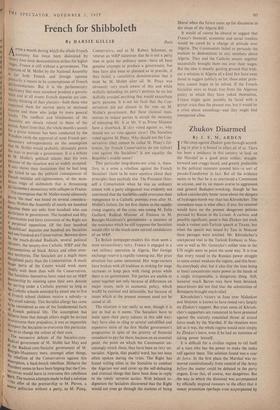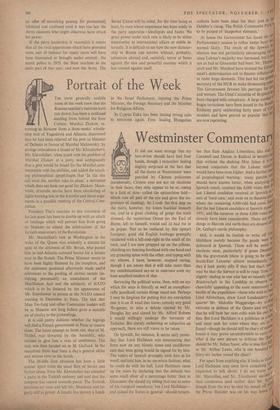Zhukov Disarmed
By J. E. M. ARDEN T F the coup against Zhukov goes through accord- ' ing to plan it is bound to affect all of us. There has been a tendency in this country to look on the Marshal as a good plain soldier, straight- forward and craggy-faced, and greatly preferable to the political monsters around him—a sort of pseudo-Eisenhower in fact. But all the evidence seems to be that he is as convinced a Communist as anyone, and by nb means averse to aggression and general Budapest-wrecking, though he has talked considerably better sense about the dangers of hydrogen-bomb war than has Khrushchev. The immediate issue is what effect, if any, his removal would have on the present dangerous policies pursued by Russia in the Levant. A curious, and possibly significant, point is that Zhukov last week made a violent anti-Turkish speech at Tirana; but when the speech was issued by Tass in Moscow these passages were omitted. Mr. Khrushchev's unexpected visit to the Turkish Embassy in Mos- cow as well as Mr. Gromyko's milder tone in the UN might seem to point the same way. It is true that every round in the Russian power struggle to some extent weakens the regime, and this bene- fits everybody else; but it also (for the time being at least) concentrates more power in the hands of a single irresponsible, a dangerous thing. Still, however much Barras may have been detested, peace-lovers did not find that the substitution of Bonaparte brought much relief.
Khrushchev's victory in June over Malenkov and Molotov is known to have rested very largely on Zhukov's support. But even some of Khrush- chev's supporters are rumoured to have protested against the scarcely concealed threat of armed force made by the Marshal. If the situation were left as it was, the whole regime would exist simply by Zhukov's leave, even if he had no intention of taking power himself.
It is difficult for a civilian regime to rid itself of a man who has the power to make the tanks roll 'against them. The solution found was a tour de force. In the first place the Marshal was re- moved constitutionally from control of the Army before the matter could be debated in the party organs. Even this, of course, was dangerous. But the way in which the dismissal was accompanied by officially inspired rumours to the effect that it meant promotion (perhaps even accompanied by
an offer of something passing for promotion), inhibited and confused until it was too late the Army elements who might otherwise have struck for power.
If the party leadership is successful it means that all the rival apparatuses which have provided some sort of balance for many years will have been eliminated or brought under control: the secret police in 1953, the State machine in the early part of this year; and now the Army. The Soviet Union will be ruled, for the time being at least, by men whose experience has been solely in the party apparatus—ideologists and hacks. No great power under such rule is likely to be either trustworthy in international affairs or stable in- ternally. It is difficult to see how the new dictator- ship in Russia can survive without, probably, adventure abroad and, certainly, terror at home against the new and powerful enemies which it has created against itself.

































 Previous page
Previous page